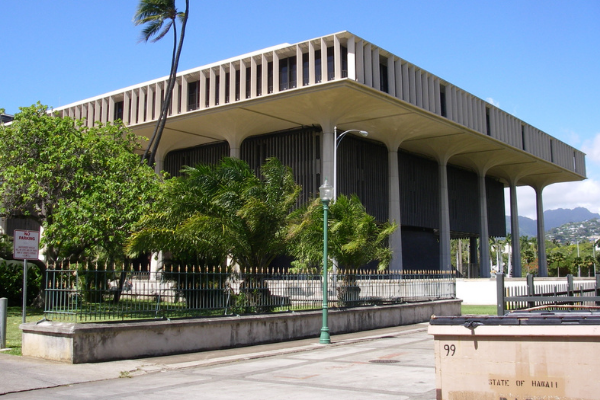Legislative session closes with crucial bills advancing Hawaii’s resiliency headed to the governor’s desk
May 27, 2022

The Hawaii State Legislature concluded its most recent session on May 5, marking its first full 60-day session since the start of the COVID-19 pandemic two years ago. Ulupono Initiative’s Director of Government Affairs Micah Munekata attended committee hearings and provided vital testimony on key measures to strengthen and increase Hawaii’s local food production and advance the state’s clean transportation and renewable energy goals. A few of these priority bills included:
STRENGTHENING FARM-TO-STATE EFFORTS
HB 1568 HD2 SD2 CD1 — Clarifies existing law around farm-to-state initiatives to directly focus on the State of Hawaii institutions with the highest quantity of food purchases, leveraging their significant power to buy local. Current law requires all State of Hawaii institutions to reach a percentage threshold of locally grown, fresh, or local value-added processed, agricultural, or food products. However, with amendments this bill introduces, the food-purchases target would focus on the State of Hawaii Departments of Education, Health, Defense, and Public Safety, as well as the University of Hawaii System. The bill also requires each to report to the Legislature its ongoing progress toward meeting these benchmarks.
HB 1600 HD1 SD2 CD1 — $35 million for a Leilehua-Mililani-Waialua complex area centralized kitchen and $5.25 million for a Leeward Coast (Nanakuli) centralized kitchen.
SUPPORT FOR LOCAL FOOD PRODUCERS
HB 2062 HD1 SD1 CD1 — State of Hawaii Department of Agriculture (HDOA) Emergency Loan Revolving Fund to support emergency ag loans. This appropriation includes $1.5 million.
INVESTMENTS IN AGRICULTURE INFRASTRUCTURE
HB 1600 provides funding for the following projects:
- Hawi Reservoir decommissioning — $500,000
- Ag infrastructure improvements on Oahu (ADC) — $4 million
- Kekaha Ditch irrigation — $3.5 million
- Wahiawa reclaimed water irrigation system — $1.62 million
- Waiahole water system Improvements — $5 million
HB 871 HD1 SD1 CD1 — Authorizes HDOA, through the Agricultural Enterprise Program, to plan, design, construct, operate, manage, maintain, repair, demolish and remove infrastructure on land under its jurisdiction to support and promote agriculture.
SB 2218 SD 1 HD1 CD2 — Requires the HDOA to establish a five-year food hub pilot program to increase access to local food and provides for the award of grant funding to qualified applicants wishing to establish or expand a food hub. The appropriation includes $1.5 million.
FOOD SAFETY
SB 2960 SD1 HD1 CD1 — Food safety certification and training to support small- and medium-sized farms with market opportunities. The appropriation includes $265,000.
ADVANCEMENTS IN RENEWABLE ENERGY
To more accurately reflect the percentage of renewable electrical energy generated in Hawaii,
HB 2089 HD1 SD2 amends the definition of renewable portfolio standard to be a percentage of electrical energy generation, rather than sales.
Other Energy Bills
HB 1800 HD2 SD2 CD1 — Statewide greenhouse gas goal to be 50% below 2005 levels by 2030. Hawaii State Energy Office study for state decarbonization pathways ($350,000).
HB 1801 HD1 SD1 CD1 — Energy efficiency for state facilities.
SB 2283 SD2 HD1 CD1 — Hawaii Natural Energy Institute (HNEI) study on hydrogen.
SB 2474 SD2 HD1 CD1 — State of Hawaii Public Utilities Commission study with a consultant on the accessibility of Hawaii’s electric system and procedures for interconnection to Hawaii’s electric system ($100,000).
SB 2478 SD2 HD2 CD1 — Reinstates the renewable fuels production tax credit.
SB 2511 SD2 HD2 CD1 — Expands Renewable Energy Technologies Income Tax Credit to include firm.
CLEAN TRANSPORTATION
Ensuring equitable access to the benefits of electric vehicles
SB 3158 SD2 HD1 CD1 — Establishes the Electric Bicycle and Electric Moped Rebate Program.
SB 3311 SD2 HD2 — Establishes interisland transportation working group and Zero-Emission Goals.
SB 2570 SD2 HD1 CD1 — Establishes zero-emission fueling system rebate with separate 3 cents of Barrel Tax and a cap of $200,000 per system.
Ulupono Initiative lauds our elected officials for advancing these key measures. Each measure will play a critical role in preparing Hawaii for the future and places our state in a stronger position to achieve its energy and food production goals.

